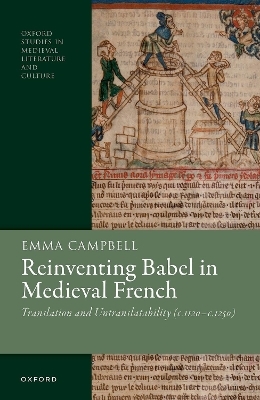
Reinventing Babel in Medieval French
Oxford University Press (Verlag)
978-0-19-287171-8 (ISBN)
How can untranslatability help us to think about the historical as well as the cultural and linguistic dimensions of translation? For the past two centuries, theoretical debates about translation have responded to the idea that translation overcomes linguistic and cultural incommensurability, while never inscribing full equivalence. More recently, untranslatability has been foregrounded in projects at the intersections between translation studies and other disciplines, notably philosophy and comparative literature. The critical turn to untranslatability re-emphasizes the importance of translation's negotiation with foreignness or difference and prompts further reflection on how that might be understood historically, philosophically, and ethically. If translation never replicates a source exactly, what does it mean to communicate some elements and not others? What or who determines what is translatable, or what can or cannot be recontextualized? What linguistic, political, cultural, or historical factors condition such determinations? Central to these questions is the way translation negotiates with, and inscribes asymmetries among, languages and cultures, operations that are inevitably ethical and political as well as linguistic.
This book explores how approaching questions of translatability and untranslatability through premodern texts and languages can inform broader interdisciplinary conversations about translation as a concept and a practice. Working with case studies drawn from the francophone cultures of Flanders, England, and northern France, it explores how medieval texts challenge modern definitions of language, text, and translation and, in so doing, how such texts can open sites of variance and non-identity within what later became the hegemonic global languages we know today.
Emma Campbell is Associate Professor/Reader in the School of Modern Languages and Cultures at the University of Warwick. Focusing on the francophone literary cultures of the Middle Ages, her work explores how contemporary approaches can be brought into dialogue with medieval texts. She has published on a range of works prior to the fourteenth century, including major traditions such as saints' lives and bestiaries. She is the author of Medieval Saints' Lives: The Gift, Kinship and Community in Old French Hagiography (2008) and co-editor of two further books, including Rethinking Medieval Translation: Ethics, Politics, Theory (2012).
Introduction: Reinventing Babel: Translation and Untranslatability in Medieval French Texts
1: Cultivating Difference: Translation and 'Remainder' in Wauchier de Denain's L'Histoire des Moines d'Egypte
2: Spiritual Translatio in the French Lives of Saint Catherine of Alexandria: Gender and Hagiographic Translation
3: Translation, Memory, and the Limits of Translatability in the Writing of Marie de France
4: Translatio and the Afterlives of Translation in Chrétien de Troyes' Cligés
5: Monolingualism, Absolute Translation, and Linguistic Mastery in Franco-English Jargon Texts: Jehan et Blonde and Renart teinturier
6: Translating Nature in French Verse Bestiaries: Translation and/as Ontology
Conclusion
| Erscheinungsdatum | 07.10.2023 |
|---|---|
| Reihe/Serie | Oxford Studies in Medieval Literature and Culture |
| Zusatzinfo | 13 Illustrations |
| Verlagsort | Oxford |
| Sprache | englisch |
| Maße | 162 x 240 mm |
| Gewicht | 690 g |
| Themenwelt | Geisteswissenschaften ► Sprach- / Literaturwissenschaft ► Anglistik / Amerikanistik |
| Geisteswissenschaften ► Sprach- / Literaturwissenschaft ► Literaturwissenschaft | |
| Geisteswissenschaften ► Sprach- / Literaturwissenschaft ► Sprachwissenschaft | |
| ISBN-10 | 0-19-287171-4 / 0192871714 |
| ISBN-13 | 978-0-19-287171-8 / 9780192871718 |
| Zustand | Neuware |
| Informationen gemäß Produktsicherheitsverordnung (GPSR) | |
| Haben Sie eine Frage zum Produkt? |
aus dem Bereich


